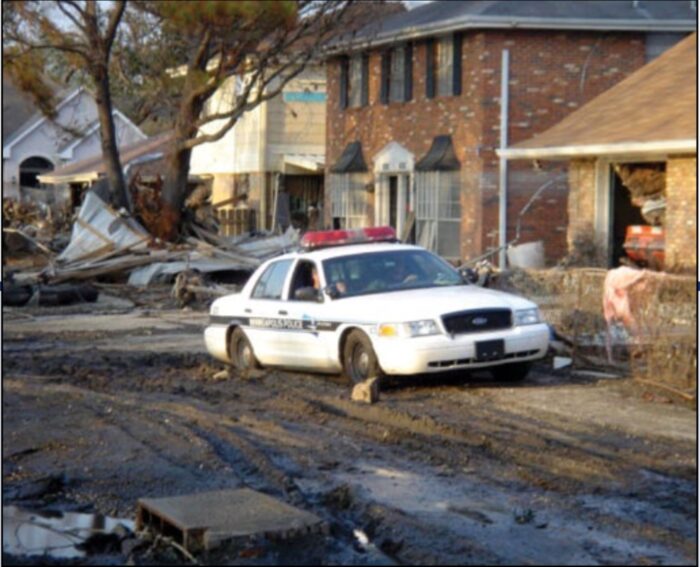We have another story to share with you from the “Minneapolis Police 150th Anniversary” book published by Acclaim Press (currently out of print).
“In the early morning hours of August 29, 2005, Hurricane Katrina hit the Gulf Coast of the United States with everything she had. Winds in excess of 140 miles per hour stretched 400 miles across. What followed was an unprecedented levee breach and massive flooding. Hundreds of thousands of people were evacuated; many returned to rebuild, facing more than $100 billion in damage.
‘It was just a mess. The swampy smell still sticks with me to this day,’ Sergeant Brian Sand recalls. ‘You could see where the water lines were, there were fridges on the tops of homes. It was crazy. And the heat was just unbelievable.’
The MPD rolled down 20 deep, packed into SUVs towing trailers full of supplies, alongside teams of officers and deputies from Bloomington, St. Paul, Ramsey County, Roseville and Maplewood. The officers arrived a few weeks after the levees broke. Eighty percent of the city had been underwater and the cops encountered a ghost town. There was no electrical power, and the people and pets the officers did run into were powerless, dehydrated and devastated.
The MPD officers gave the New Orleans Police Department officers a chance to catch a much needed break. ‘By the time we got down there the New Orleans cops were just wiped. They were running on fumes. When we got down there it was kind of a relief for them because they were then able to go home and take care of their own families. The cops were finally able to collect belongings from their own homes; a lot of these guys lost everything down there,’ Sergeant Patti Hellen remembers.
The Minneapolis PD team was requested through MPD Sergeant Otto Wagenpfeil, a “Big Easy” native. After 23 days of work in difficult and devastating conditions, the group took a vote, and decided to stay another seven days to continue to help. The water in the Lower 9th Ward was just starting to recede.
Two thousand people died from this weather catastrophe that affected 90,000 square miles of the United States. It would be impossible to quantify, or assess a value, on how much the MPD’s presence was worth in the aftermath.
‘We just did it to help. I think the bigger sacrifice was people left their families behind for 30 days, but it was one of the best experiences I’ve ever had. To say you were down there and able to help? That’s something that will always stick with me,’ Sand explained.”
Article originally published in the Minneapolis StarTribune

Good story! Thank you for all the history emails Aileen! 😁
We are glad that you are enjoying our stories, Sharon. Thank you!